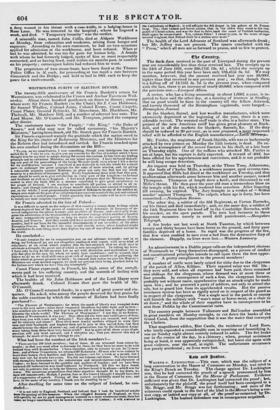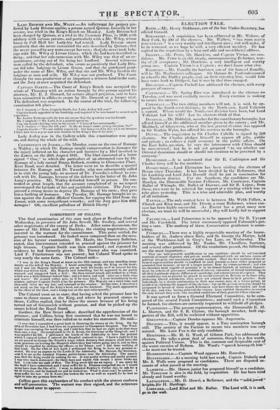Rats attli Suitite.
WALKP.11 LVEIIIINGTON.—This case, which was the subject of a long conversation in the House of Commons on- MOnday, was tried in the King's Bench on Tuesday. The charge against Dr. Lushingion was, that he had corrected the .proofs of a-speech pronounced by him in the House of Commons, for the Mirror of Parliament. Evidence sufficient was given that Dr. Lushington bad corrected the proof; -hut, unfortunately for the plaintiff, the proof itself had been consigned to a Mr. Briggs, and Mr. Briggs was not forthcoming ; and none of the witnesses could speak to the fact of the libel in theMirror's being a cor- rect copy,-or indeed any copy-at all, of the woe as•coriected hyDr. Lushington. The learned defendant wan in consequence acquitted.. , LADY„ BRISCOE AND MR: indictment. for perjury pre- ferred by Lady Briseoeagainsc a person named Quinan, formerly in her service, was tried in the King's Bench on Monday. Lady Briscoe had been charged by Quinan, at a trial in the Common Pleas, in MO, with adultery with various persons, and particularly with a Mr. Wiley, whose house in Pall Mall her 'Ladyship had rented. Lady Briselie swore positively that she never committed the acts described by Quinan ; that she never passed by any name except her own ; that; she never took lodg- ings with Mr. Wiley at LisSon Grove, which she had been described as doing; and that her sole connexion. with Mr. Wiley was that of an ac- quaintance, arising our of his being her landlord. Several witnesses were called by the defendant, who swore as positively that Lady Bris- coe did take lodgings in Lisson Grove, and that she purchased goods under the name of Mrs. Wiley, and that she and Mr. Wiley lived in the lodgings as mini and wife. Mr Wiley was not produced. The Court thought the non.production of so important a witness fatal to the case, and the Jury at once acquitted the defendant.
CAPTAIN GARTIL—Tbe Court of King's Bench was occupied the whole of Thursday with an action brought by this person against his attorney, Mr. E. J. Howard, for certain alleged perjuries, said to have been committed in affidavits sworn by Mr. froward at a former trial. The defendant was acquitted. In the course of the trial, the following examination tok place—
Sir J. Searlett-" Now. Captain Garth. has Lady Astley left you?" Captain Garth appealed to his Lordship, and inquired if he was bound to answer such a question. Mr. Justice Patteson said, be was not aware that the question was irrelevant. Mr. Campbell-" My Lord, it is a painful question." Cap' obi siardi (having rears in his eyes)-" I bear of her occasionally."
Sir J. Searle:2= has she left you? Is she no longer under your p.otection. Sir?" Captain Garth-" We are widely separa!ed. She has CCitRd to live whit me because I have now beeu a year and nine mouths la the Kings Ilea-lf far debt. '
Lady Astley was in the Gallery while this .examination was going
• on, and during the whole of the trial. •
CONSISTENCY OF JURIES.—On Monday, came on the ease of Ramage v.'Wakley ; in which Dr. Ramage sought compensation in damages for the injury indicted on his character bud business by a libel inserted in the Lancet, on the 2.0th August 1831. The libel conSisted of a letter signed. " One," in which the particulars of an attempted cure by Dr. Ramage of a lady named Emma Bullock, residingin Gloucester Place, Kent Road; were detailed. The letter went on to describe a quarrel between Dr. Ramage and Dr. Tweedie, who was subsequently called in to visit the young lady, on account of Dr: Tweedie's refusal to Con- sult with Dr: Ramage, because of the defence by the latter of St. John Long's practice. Mr. Wakley defended himself in person. He con- tended at great length, that the account complained of in no respect overstepped the latitude of fair and justifiable criticism. The Jury ex- pressed a strong desire to deprive Dr. Ramage of his costs; they giive him a farthing of damages. On Tuesday, Dr. Ramage brought an ac- tion against the London Medical Gazette, for copying the libel from the Lancet, with some insignificant remarks; and the Jury gave him 4001.
dathages 06, excellent palladium of British liberty!



























 Previous page
Previous page